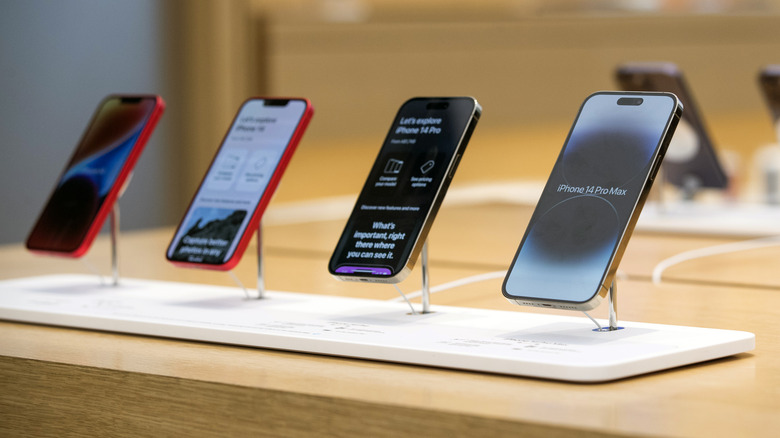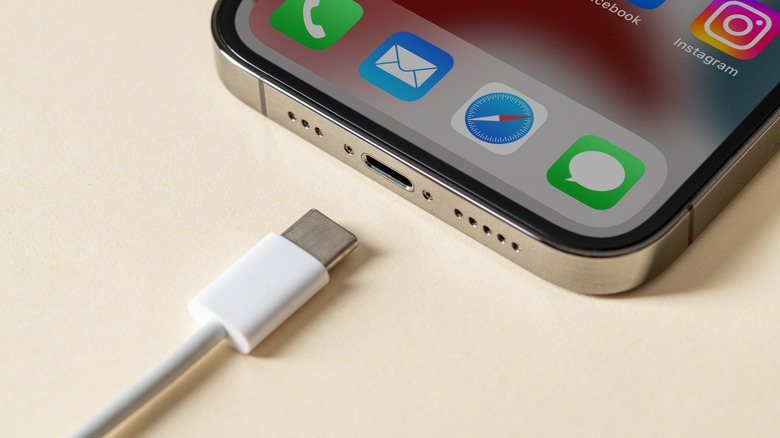Apple May Restrict Faster USB-C Transfer Speeds To Top-End iPhone 15 Models
Earlier this year, the European Union (EU) passed a law mandating a common charging standard for small consumer electronics goods like smartphones and tablets. The organization chose USB-C as their preferred charging/connectivity standard and gave manufacturers a two-year time frame to implement the changes to their products. Apple — which has been using its proprietary Lightning port as its charging standard on iPhones for several years — was impacted most by the EU's mandate. Despite the company making several appeals against the common charger mandate, the EU pressed ahead and passed the law anyway.
A few days after the law was officially passed, a senior executive confirmed that Apple would switch to USB-C soon. While Apple is not legally required to make the switch before 2024, several reports have indicated that the official switch from Apple's old Lightning Port should happen in 2023 — when the company announces the iPhone 15 lineup.
Besides the obvious advantage of not having to lug around separate charging cables for the iPhone, the switch to USB-C also meant the possibility of future iPhones getting much improved wired data transfer speeds enabled by USB-C. While future iPhones will almost certainly get faster charging and data transfer speeds enabled by USB-C, a report by noted analyst Ming-Chi Kuo has indicated that Apple may throttle transfer speeds on its lower-end iPhones and reserve faster data transfer speeds to its more expensive iPhone 15 Pro models.
Want faster data transfer speeds? Get a more expensive iPhone
According to noted Apple analyst Ming-Chi Kuo, Apple will almost certainly switch to USB-C on its 2023 iPhone models. However, the company is likely to restrict data transfer speeds on its lower-tier models — the iPhone 15 and the iPhone 15 Plus — to USB 2.0 speeds. As a result, consumers wanting to unlock the full capabilities of USB-C may be required to shell out more money for Apple's top-end iPhone 15 Pro and iPhone 15 Pro Max models. Unfortunately, this would mean that the lower-priced iPhone models will get no improvement in data transfer speeds over existing iPhone models despite switching to a supposedly newer, faster connectivity standard.
(4/7)
2H23 new high-end iPhones' wired transfer speed will likely improve markedly, benefiting the growth of the high-speed transfer IC design industry. Apple's existing suppliers (e.g., Parade, Asmedia, Genesys Logic, Renesas, etc.) are expected to be leading beneficiaries.— 郭明錤 (Ming-Chi Kuo) (@mingchikuo) November 17, 2022
In a series of tweets announcing these possibilities, Kuo reveals that the iPhone 15 Pro and iPhone 15 Pro Max models could support USB 3.2 or Thunderbolt 3 speeds, improving the wired transfer speeds on these models considerably over current iPhone models. In addition, support for Thunderbolt 3 will also open up an entirely new way of using the iPhone as a wired video output device — a feature content creators have been looking forward to on the iPhone for years.
Given that we are several months away from the launch of the next generation iPhones, it is too early to say if Apple will, indeed, go ahead with this change. However, at the same time, Ming-Chi Kuo has had a pretty spotless record regarding Apple-related rumors.

